
July 21
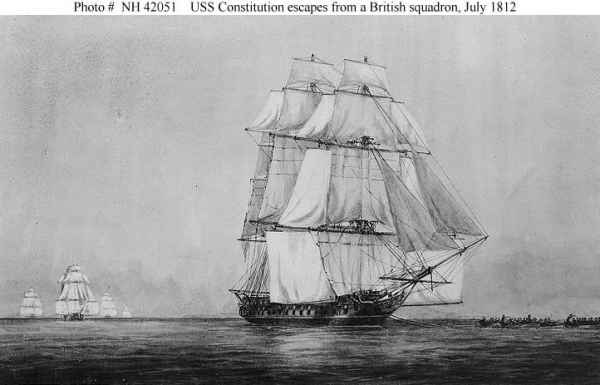
1812 Captain Isaac Hull of the Frigate USS Constitution to Secretary of the Navy Paul Hamilton:
Soon after 9 a Second Frigate passed under our lee, and opened her Broadside, but finding her shot fall short, discontinued her fire, but continued as did all the rest of them, to make every possible exertion to get up with us. From 9 to 12 all hands were employed in warping the Ship ahead, and in starting some of the water in the main Hold, to lighten her, which with the help of a light air, we rather gained of the Enemy, or at least hold our own. [For the full text, Click here.]
[For further details, Click here.]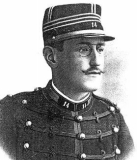
1906 The Dreyfus case concludes as Frenchman Alfred Dreyfus is acquitted on appeal, of espionage for which he had served 10 years in prison. It is believed that Dreyfus, a Jew, was wrongly convicted because of anti-Semitism and to protect the identity of the real culprits.
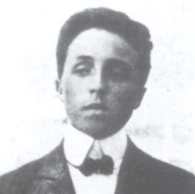
1908 Adolf Hitler—living in Vienna—addresses a three-page letter to his "Dear Friend" and roommate, August Kubizek (above), who is visiting his parents in Linz:
Perhaps you have wondered why I have not written for so long. The answer is very simple. I don't know what I could tell you which would especially interest you. First, I am still in Vienna and will remain here. Alone, because Frau Zakreys is staying with her brother. Nevertheless, everything goes well in my life as a recluse. There's only one thing wrong. Formerly, Frau Zakreys always knocked on my door early, so I got up and was soon at work, but now I have to rely on my own efforts.
Is there any news from Linz? Is there any news about the Society for Rebuilding the Theater? When they have finished the bank, please send me a picture postcard of it. And now I have two requests to make. First: Would you be so good as to buy for me a copy of Guide to the Danube City of Linz, not the Wohrl, but the actual Linz one published by Krakowitzer. On the cover is a picture of a girl from Linz, and in the background there is Linz seen from the Danube, with the bridge and the castle. It costs 60 Heller, which I enclose in stamps. Please send it to me immediately either postage paid, or collect. I will pay the expenses. Be sure that the timetable of the steamship company and the plan of the city are included. I need a few figures, which I have forgotten and cannot find in Wohrl.
And secondly I would be pleased if would get me a copy of the guide you had here when you next go on the steamship, and I will pay you "as you please." You will do this, won't you? I don't know anything else to say except that this morning I caught an enormous army of bugs, which were soon swimming dead in "my" blood, and now my teeth are chattering in the "heat." I believe there have been so few summers with such cold days as these. It is the same where you are, I suppose. Now with kindest regards to you and to your esteemed parents, and once more repeating my requests, I remain yr. fr. [For further details, Click here.]
1911 Countdown to World War: David Lloyd George delivers Mansion House speech:

Lloyd George, a radical member of the Liberal government of Prime Minister Herbert Asquith, had made a name for himself as a leftist, anti-imperialist influence in the party, promoting pension plans for the elderly and national insurance and opposing Britain s policies in the South African, or Boer War in 1899-1902. His speech at the Mansion House, however, came in the wake of the Second Moroccan Crisis, a clash between the great European powers that began on May 21, 1911, when French troops occupied the city of Fez in Morocco, at the appeal of the sultan, to restore order after rebel tribes threatened the city. On July 1, 1911, Germany sent its gunboat Panther to the port of Agadir as a forceful protest against French influence in Morocco and the Congo. Though Germany assumed Britain would stay out of the conflict and that, once isolated, France would give way, that was not the case. Rather than use his annual speech as an opportunity to advocate for pacifism and disengagement from the conflict between France—Britain s ally, along with Russia, in the so-called Triple Entente—and an aggressive Germany, Lloyd George made clear that Britain would not stand down . . . .
The Mansion House speech made it clear to Germany that France was not isolated. Kaiser Wilhelm, reluctant from the beginning to make such an aggressive move, directed his foreign office to back down. In an agreement concluded in November 1911, France received German recognition of its protectorate over Morocco, which it added to its North African holdings of Algeria and Tunisia. Germany, in return, was awarded some compensation in other areas of Africa, which it considered inadequate. From that point forward, the battle lines of the future war—World War I—became increasingly clear: Britain, and Russia, would stand with France in any future conflict that threatened its security. Meanwhile, an isolated Germany began to shore up its own alliances, namely with the Austro-Hungarian Empire, and build up its own strength in order to be prepared for the next move.

1915 World War I: Various:
List Regiment: Gefreiter Adolf Hitler's 16 Reserve Infantry Regiment continues to occupy a position at Fromelles—pictured above in a drawing by Hitler—on a level field with water channels, willow trees and willow stalks. In the distance towards the enemy lines lies an insignificant wood with barbed wire entanglements. Under the direction of their defense-minded commander, Lieutenant General Gustav Scanzoni von Lichtenfels, the regiment works ceaselessly day and night to further fortify their position at Fromelles while fighting off repeated assaults by the enemy. [For further details, Click here.]
Lusitania: President Woodrow 'And This Time I Mean It' Wilson sends a third note to the Germans:

The Government of the United States is not unmindful of the extraordinary conditions created by this war or of the radical alterations of circumstances and method of attack produced by the use of instrumentalities of naval warfare which the nations of the world can not have had in view when the existing rules of international law were formulated, and it is ready to make every reasonable allowance for these novel and unexpected aspects of war at sea; but it can not consent to abate any essential or fundamental right of its people because of a mere alteration of circumstance.
The rights of neutrals in time of war are based upon principle, not upon expediency, and the principles are immutable. It is the duty and obligation of belligerents to find a way to adapt the new circumstances to them.
The events of the past two months have clearly indicated that it is possible and practicable to conduct such submarine operations as have characterized the activity of the Imperial German Navy within the so-called war zone in substantial accord with the accepted practices of regulated warfare.
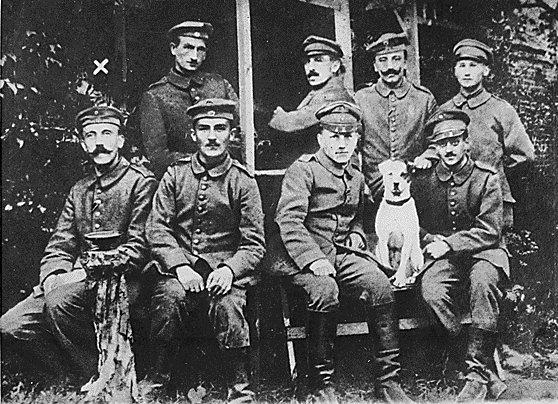
1916 World War I: List Regiment: Gefreiter Adolf Hitler endures trench warfare in Flanders (Artois) with 3 Company, 16 Reserve Infantry Regiment. [For further details, Click here.]
1917 World War I: Russian Army Commander-in-Chief Alexei Brusilov's Official Announcement on the Kerenski Offensive:
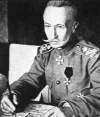
After strong artillery preparation, the enemy persistently attacked our detachments on the Pieniaki-Harbuzow front [on both sides of the headwaters of the Sereth and 20 miles south of Brody]. At first all these attacks were repelled. At 10 o'clock, July 19th, the 607th Mlynoff Regiment, situated between Batkow and 11-Ianajow (in the same region), left their trenches voluntarily and retired, with the result that the neighbouring units had to retire also. This gave the enemy the opportunity for developing his success. Our failure is explained to a considerable degree by the fact that under the influence of the extremists (Bolsheviks) several detachments, having received the command to support the attacked detachments, held meetings and discussed the advisability of obeying the order, whereupon some of the regiments refused to obey the military command. The efforts of the commanders and committees to arouse the men to the fulfilment of the commands were fruitless."
List Regiment: Gefreiter Adolf Hitler's 16th RIR remain deployed for Phase 1 operations in Flanders, Belgium. [For further details, Click here.]
1918 World War I: List Regiment (July 20-August 4):Gefreiter Adolf Hitler's 16th RIR is tasked with building a new line of defenses on the site of the failed Second Battle of the Marne. [For further details, Click here.]
1919 Britain: The House of Lords ratifies the Versailles Treaty. Click here for the complete text.
1921 Countdown to Pearl Harbor: General William "Billy" Mitchell orchestrates the sinking of the German battleship Ostfriesland in a demonstration of concentrated bombing. He is convinced of the superiority of air power over sea power, but most of his peers are not.
Mitchell drew the ire of the top brass in the US military by insisting that such strategic assets as Pearl Harbor were vulnerable to air strikes, a position that led to his dismissal. Ultimately, he will be exonerated and re-commissioned. Although Mitchell had stressed "war-time conditions", the tests were under static conditions and the sinking of the Ostfriesland was accomplished by violating agreed-upon rules that would have allowed Navy engineers to examine the effects of various munitions; Mitchell's airmen disregarded the rule and quickly sank the ship in a coordinated attack. This proved—at least to Mitchell—that surface fleets were obsolete. Click here for further information.
1933 Holocaust: Various:
Nuremberg: The SA arrests 300 Jewish store owners, and parades them through the streets for hours.
London: The Board of the Federation of Synagogues votes to endorse the anti-Nazi boycott.
1940 World War II: Various:
Baltics: In accordance with the results of the July 14 referendums blatantly rigged by the Soviet occupying power, Lithuania, Estonia, and Latvia are annexed by the Soviet Union.
Countdown to Barbarossa: Hitler tells the Military High Command that Germany must prepare to attack the Soviet Union:
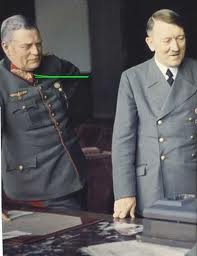
Hitler preached that there was one big reason why the Russians had fallen so completely under the spell of Jewish communism: they were Slavs, a subhuman race that was barely worthy of being slaughtered by Nazi bullets and bayonets. Hitler expected that there would be little resistance from such creatures when it came time to attack them. "We'll kick the front door in," he bragged, "and the whole rotten structure will come crashing down."
One of Hitler's constant refrains was that Germans all over Europe had been crammed into cruelly divided and reduced territories for centuries, and that their defeat in World War I had allowed their enemies to hedge them in with "artificial" nations like Poland and Czechoslovakia. This was an intolerable situation, for all Germans deserved to live together as one great family.
But the reunion of all Germans in one German super-state would only be a beginning. In the 1930s the world heard endless demands from Hitler for more Lebensraum ("living space"), and the obvious targets for seizure and colonization were the vast spaces of the Ukraine and Russia.
1941 World War II: Various:
Barbarossa: The Luftwaffe launches its first bombing raid (127 aircraft) on Moscow, which is followed by another 73 raids until the end of the year.
Thanks to this complete surprise, the invading German military caught the Russian army in a very bad position. The Russian losses in men and equipment were tremendous, they lost not just the entire vast territory between Poland and Moscow, but also almost the entire military force that was there.
The advancing German army, aided by efficient tactical air support of the Luftwaffe which dominated the sky above, advanced all the way to Moscow, but there and then, in the extreme winter of late 1941, the German military ran out of both time and thrust
Mediterranean: A British 7-ship convoy from Gibraltar to Malta escorted by heavy units of the Royal Navy is attacked by Italian bombers and MTBs which sink one merchant ship. The destroyer HMS Fearless, while screening HMS Ark Royal, suffers an attack by an Italian torpedo bomber. She catches fire, loses all power, is judged too damaged to tow and is scuttled north of Bone, Algeria.
[See: The Mediterranean Strategy.]Vichy France: France accepts Japan's demand for military control of Indochina:
Today, Vichy supporters continue to maintain the official argument advanced by Petain and Laval: the state collaboration was supposed to protect the French civilian population from the hardships of the Occupation. After the war, former Collaborationists and "petainistes" (supporters of Petain) claimed that while Charles de Gaulle had represented the "sword" of France, Petain had been the "shield" which protected France. The common "sword vs. shield" thesis is contradicted by rational historical argumentation. First of all, it bypasses the French Resistance, insidiously claiming that the alternative was "collaboration in France" and "resistance in London". This is a clear denial of the engagement of civilians, in particular foreign Jews, who took an active part in the Resistance in France.
Holocaust: Majdanek (Maidanek) concentration camp is established:

In sharp contrast to the extermination camp at Treblinka, which is in a wooded area . . . the Majdanek concentration camp is situated in a major urban area, four kilometers from the city center of Lublin, and can be easily reached by trolley car. The location of the Majdanek camp is in an area of rolling terrain and can be seen from all sides; it could not be more public or accessible.
The Majdanek concentration camp is located in an entirely open area with no ten-foot wall around it to hide the activities inside the camp, as at Dachau. There was no security zone established around the Majdanek camp, as at Birkenau, and there is no natural protection, such as a river or a forest, as at Treblinka. Besides being bounded on the north by a busy main road, the camp was bounded on the south by two small villages named Abramowic and Dziesiata. People driving past the camp, while it was in operation, had a completely unobstructed view, being able to see the tall brick chimney of the crematorium wafting smoke from the top of a slope not far away, and the gas chamber building which is a few yards from a busy street.
1944 Hitler to Germany--"I'm still alive":
On this day in 1944, Adolf Hitler takes to the airwaves to announce that the attempt on his life has failed and that "accounts will be settled."
Hitler had survived the bomb blast that was meant to take his life. He had suffered punctured eardrums, some burns and minor wounds, but nothing that would keep him from regaining control of the government and finding the rebels. In fact, the coup d'etat that was to accompany the assassination of Hitler was put down in a mere 11 1/2 hours. In Berlin, Army Major Otto Remer, believed to be apolitical by the conspirators and willing to carry out any orders given him, was told that the Fuhrer was dead and that he, Remer, was to arrest Joseph Goebbels, Minister of Propaganda. But Goebbels had other news for Remer-Hitler was alive. And he proved it, by getting the leader on the phone (the rebels had forgotten to cut the phone lines). Hitler then gave Remer direct orders to put down any army rebellion and to follow only his orders or those of Goebbels or Himmler. Remer let Goebbels go. The SS then snapped into action, arriving in Berlin, now in chaos, just in time to convince many high German officers to remain loyal to Hitler.
Arrests, torture sessions, executions, and suicides followed. Count Claus von Stauffenberg, the man who actually planted the explosive in the room with Hitler and who had insisted to his co-conspirators that "the explosion was as if a 15-millimeter shell had hit. No one in that room can still be alive." But it was Stauffenberg who would not be alive for much longer; he was shot dead the very day of the attempt by a pro-Hitler officer. The plot was completely undone.
Now Hitler had to restore calm and confidence to the German civilian population. At 1 a.m., July 21, Hitler's voice broke through the radio airwaves: "I am unhurt and well. . . . A very small clique of ambitious, irresponsible . . . and stupid officers had concocted a plot to eliminate me. . . . It is a gang of criminal elements which will be destroyed without mercy. I therefore give orders now that no military authority . . . is to obey orders from this crew of usurpers. . . . This time we shall settle account with them in the manner to which we National Socialists are accustomed." (history.com)
Death: Claus von Stauffenberg: German army colonel, the leading figure of the July 20 Plot of 1944 to kill Adolf Hitler:
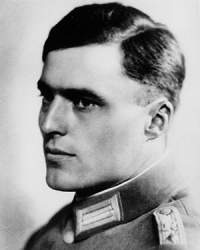
Claus von Stauffenberg was born in Jettingen,Germany on November 15, 1907. In his youth, he belonged to Stefan George's circle and remained a disciple of the great poet for the rest of his life. He would quote George's The Anti-Christ when recruiting friends and trusted colleagues into the conspiracy.
A bright student, at nineteen he became an officer cadet. He attended the War Academy in Berlin and joined the General Staff in 1938 as a quartermaster officer in 1938 in General Erich Hoepner's 1st Light Division, which was renamed 6th Panzer Division in November 1939.
Stauffenberg served combat positions in all of Hitler's major campaigns from the Sudetenland to Poland to France to Tunisia. During Operation Barbarossa, Stauffenberg became appalled by the atrocities committed by the Schutzstaffel (SS), SD and "Security Police" units, particularly the mass murder of the Jews in Russia, but he was equally appalled by the atrocities committed by the German Army against Soviet prisoners-of-war and by the treatment of the civil population in Russia at the hands of the German occupation administration and forces, and Stauffenberg cited these matters to Major Joachim Kuhn in August 1942.
From the end of May 1940 to the end of January 1943, Stauffenberg served in the Army High Command/General Staff Headquarters.
In early 1943, Stauffenberg served with the 10th Panzer Division in Field Marshal Erwin Rommel's Afrika Korps. On April 7, 1943, he was seriously wounded at Sebkhet en Noual, south of Mezzouna in the North African desert, when Allied fighters strafed his vehicle. He lost his left eye, right hand, and last two fingers of his left hand after surgery.
Stauffenberg had decided in 1942 that he must try to help overthrow Hitler. He had attempted throughout the summer of 1942 to persuade senior commanders to move against Hitler, and he had declared in September 1942 that he himself was prepared to kill Hitler. In 1943, he only agreed to join in conspiracy with the civilian side of the German Resistance, including Wilhelm Canaris, Carl Goerdeler, Julius Leber, Ulrich Hassell, Hans Oster, Henning von Tresckow, Fabian von Schlabrendorff , Peter Graf Yorck von Wartenburg, Ludwig Beck, and Erwin von Witzleben in what became known as the July Plot. According to the plan, after Adolf Hitler, Hermann Goering and Heinrich Himmler were assassinated, Ludwig Beck, Erwin von Witzleben and Friedrich Fromm would take control of the German Army and seize key government buildings, telephone and signal centres, and radio stations. Stauffenberg was to become State Secretary of the War Ministry in the post-coup government.
In June 1944, Stauffenberg was promoted to Colonel and appointed Chief of Staff to Home Army Commander General Friedrich Fromm. This gave him direct access to Hitler's briefing sessions.
On July 11, Stauffenberg brought a bomb concealed in a briefcase with him to a briefing at Hitler's Berghof residence. He planned to assassinate Hitler that day, but circumstances beyond his control prevented him from doing so.
Four days later, Stauffenberg flew to the Fuehrer's Wolf's Lair headquarters with aide and co-conspirator Captain Klausing. He was ordered by senior conspirators in Berlin to abort the attempt after telephoning to report the absence of Reichsfuehrer SS Heinrich Himmler and Luftwaffe Air Marshal Hermann Goering from the briefing session. He secretly agreed with close friend and Berlin co-conspirator Colonel von Mertz to try to kill Hitler anyway, but when he returned to the briefing room, he discovered the session had ended after only five minutes.
On July 20, Stauffenberg flew to the Wolf's Lair again with aide and co-conspirator Lt. Werner von Haeften. Stauffenberg, who had never met Hitler before, carried the bomb in a briefcase and placed it on the floor while he left to make a phone call. The bomb exploded. Of four men in the hut who died of the attack, only one was killed outright. Another died in the afternoon, and two more died later in hospital. Hitler's right arm was badly injured, but he survived the bomb blast. Stauffenberg returned to Berlin with Haeften and arrived at Army High Command Headquarters at 4:30 P.M. to launch the planned coup. The plot unraveled, however, for several reasons: Hitler survived the attack; co-conspirator General Friedrich Olbricht neglected to set the coup in motion during first two hours after the attempt; and the conspirators failed to seize any radio stations or retain authority over reserve army troops in Berlin.
In an attempt to protect himself, Fromm organized the execution of Stauffenberg along with three other conspirators, Friedrich Olbricht, Werner von Haeften, and Colonel Albrecht Ritter Mertz von Quirnheim, in the courtyard of the War Ministry. On July 21, 1944, at 12:30 A.M., Stauffenberg was executed by firing squad. It was later reported that Stauffenberg died shouting, "Long live free Germany." (Jewish Virtual Library)
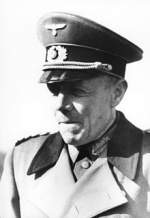
Death: Ludwig Beck: Chief of Staff of the German Armed forces during the early years of the Nazi regime in Germany before World War II.
In 1943, Beck planned two abortive attempts to kill Hitler by means of a bomb. In 1944 he was one of the driving forces of the July 20 Plot with Carl Goerdeler and Colonel Count Claus von Stauffenberg. The plot failed, and by the next morning Beck was under the custody of General Friedrich Fromm, and ordered to commit suicide. In severe distress, Beck succeeded only in wounding himself, and a sergeant had to be brought in to help finish the job.
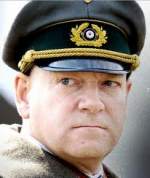
Death: Major General Herrmann von Tresckow, a Major General in the German Wehrmacht who organized German resistance against Adolf Hitler. He attempted to assassinate Hitler in March 1943 and drafted the Valkyrie plan for a coup against the Nazi regime. He was described by the Gestapo as the "prime mover" and the "evil spirit" behind the July 20 plot to assassinate Hitler . . . .
When the assassination attempt on Hitler and the following coup in Berlin (July 20 Plot) had failed, Tresckow decided to commit suicide at the front in Krolowy Most near Bialystok on July 21. His parting words to Schlabrendorff were:
"The whole world will vilify us now, but I am still totally convinced that we did the right thing. Hitler is the archenemy not only of Germany but of the world. When, in few hours' time, I go before God to account for what I have done and left undone, I know I will be able to justify what I did in the struggle against Hitler. God promised Abraham that He would not destroy Sodom if just ten righteous men could be found in the city, and so I hope that for our sake God will not destroy Germany. No one among us can complain about his death, for whoever joined our ranks put on the shirt of Nessus. A man's moral worth is established only at the point where he is ready to give up his life in defense of his convictions."
To protect other conspirators, he staged an appearance of partisan attack by firing his pistols and then dispatched himself by holding a hand grenade below his chin. He was buried in the family home in Wartenberg. When the Nazis learned about his connections in late August, his body was exhumed and taken to the crematorium of Sachsenhausen concentration camp.
Other deaths: General Friedrich Fromm, Commander-in-Chief of the Replacement Army, himself a suspected conspirator who was later executed, held an impromptu court martial and condemned the ringleaders of the conspiracy to death. Stauffenberg, along with fellow officers General Olbricht, Leutnant von Haeften and Oberst Albrecht Mertz von Quirnheim, were shot later that night by firing squad in the courtyard of the Bendlerblock (Headquarters of the Army) in Berlin. As his turn came, Stauffenberg spoke his last words: "Es lebe unser heiliges Deutschland!" ("Long live our sacred Germany!"). In an attempt to assuage his troubled conscience for assassinating his fellow conspirators, General Fromm gave the officers an honorable burial with their medals; the next day, however, Stauffenberg's body was exhumed, stripped of his medals and burned.
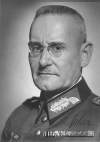
General Franz Halder is arrested by the Gestapo. He will be held in several different concentration camps until released by the Allies in 1945.
It was Nicky Kaldor, now Lord Kaldor, who first told me about it the plot of the German generals in 1938. After the war he interrogated Halder, who was the Chief of the German General Staff in 1938. The plan was to arrest the Nazi leaders in Berlin, and proclaim a military government. All the leading German generals were in, or connived at, the plot: Brauchitsch, the Commander-in-Chief; von Rundstedt; Beck; Stulpnagel; Witzleben, Commander of the Berlin Garrison; and also Graf Helldorf, who was chief of the Berlin police. Nicky Kaldor gave me full details of the plot, which I passed on to Churchill who printed them in full, without acknowledgement, in The Gathering Storm. Halder said that he called off the plot at the eleventh hour when Chamberlain's flight to Berchtesgaden was announced. He decided that if Hitler could get away with this he could get away with anything. Of Munich he said: "Never in history has there been such a betrayal. A country, at least equal to ours, forced to give up the strongest defence line in Europe. How could I have foreseen it?" In his view Germany would have been defeated in three weeks in the event of war. (Lord Boothby)
From a speech by Grand Admiral Karl Doenitz:
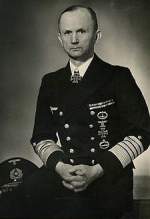
Men of the Navy! Holy wrath and unlimited anger fill our hearts because of the criminal attempt which was to have cost the life of our beloved Fuehrer. Providence wished it otherwise, watched over and protected our Fuehrer, and did not abandon our German fatherland in the fight for its destiny.
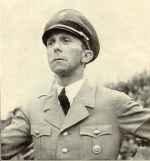
Goebbels is named "General Plenipotentiary for the Mobilization of Total War."
On 21 July the Americans landed on both sides of the Orote peninsula on the west of Guam, planning to cut off the airfield. The 3rd Marine Division landed near Agana to the north of Orote at 08:28, and the 1st Provisional Marine Brigade landed near Agat to the south. Japanese artillery sank 20 LVTs but by 09:00 tanks were ashore at both beaches. The 77th Infantry Division had a more difficult landing. Lacking amphibious vehicles, they had to wade ashore from the edge of the reef where they were dropped by their landing craft. By nightfall on 21 July the Americans had established beachheads about 2 km deep. Japanese counter-attacks were made throughout the first few days of the battle, mostly at night, using infiltration tactics . . . . [For further details, Click here.]
The Polish Committee for National Liberation is set up by Stalin to establish control of Poland. Next day the Committee is declared the new provisional government of Poland.
Later in the war, the fate of Poland came to depend on the Soviet Union, which was initially the agent of deliverance from Nazi tyranny but later was the bearer of a new form of oppression. Stalin responded to Polish indignation over the Katyn Massacre by establishing an alternative Polish government of communists.
1945 Nuremberg Tribunal: Supreme Court Justice Jackson returns to Nuremberg with British and French representatives, to inspect possible housing accommodations. (Maser II)
1950 Spandau Prison: From Spandau: The Secret Diaries, by Albert Speer:
In spite of Schirach's open disapproval, Funk sat down beside me on the garden bench today. We are both listless from the monotonous food of the Russian month. Five steps away from us is a bed of cucumbers. Suddenly Funk says after a pause, "I would like to eat a cucumber. How about you?" I say no. Long pause. Funk sits still until I comment: "This is psychologically interesting. Probably you lack the energy to stand up alone." Funk shakes his head apathetically. "No, that isn't it. But if you would do it, I would ask you to bring me one." (Speer II)
1955 Cold War: Eisenhower presents his "Open Skies" plan:

President Dwight D. Eisenhower presents his "Open Skies" plan at the 1955 Geneva summit meeting with representatives of France, Great Britain, and the Soviet Union. The plan, though never accepted, laid the foundation for President Ronald Reagan's later policy of "trust, but verify" in relation to arms agreements with the Soviet Union. [For further details, Click here.]
1960 Germany passes controversial "Volkswagen Law":

On this day in 1960, the German government passes the "Law Concerning the Transfer of the Share Rights in Volkswagenwerk Limited Liability Company into Private Hands," known informally as the "Volkswagen Law."
Founded in 1937 and originally under the control of Adolf Hitler's National Socialist (Nazi) Party, Volkswagen would eventually grow into Europe's largest car manufacturer and a symbol of Germany's economic recovery after the devastation of World War II. The Volkswagen Law, passed in July 1960, changed the company to a joint stock corporation, with 20 percent held each by Germany and Lower Saxony, the region in which Volkswagen is still headquartered. By limiting the share of any other stockholder to 20 percent, regardless of how many shares owned, the law effectively protected the company from any attempt at a hostile takeover. [For further details, Click here.]
Edited by Levi Bookin (Copy editor)
levi.bookin@gmail.com



Click to join 3rdReichStudies



Disclaimer: This site includes diverse and controversial materials—such as excerpts from the writings of racists and anti-Semites—so that its readers can learn the nature and extent of hate and anti-Semitic discourse. It is our sincere belief that only the informed citizen can prevail over the ignorance of Racialist "thought." Far from approving these writings, this site condemns racism in all of its forms and manifestations.
Fair Use Notice: This site may contain copyrighted material the use of which has not always been specifically authorized by the copyright owner. We are making such material available in our efforts to advance understanding of historical, political, human rights, economic, democracy, scientific, environmental, and social justice issues, etc. We believe this constitutes a "fair use" of any such copyrighted material as provided for in section 107 of the US Copyright Law. In accordance with Title 17 U.S.C. Section 107, the material on this site is distributed without profit to those who have expressed a prior interest in receiving the included information for research and educational purposes. If you wish to use copyrighted material from this site for purposes of your own that go beyond 'fair use', you must obtain permission from the copyright owner.
Please Note: The list-owner and moderators of 3rdReichStudies are not responsible for, and do not necessarily approve of, the random ads placed on our pages by our web server. They are unfortunately, the price one pays for a 'free' website.